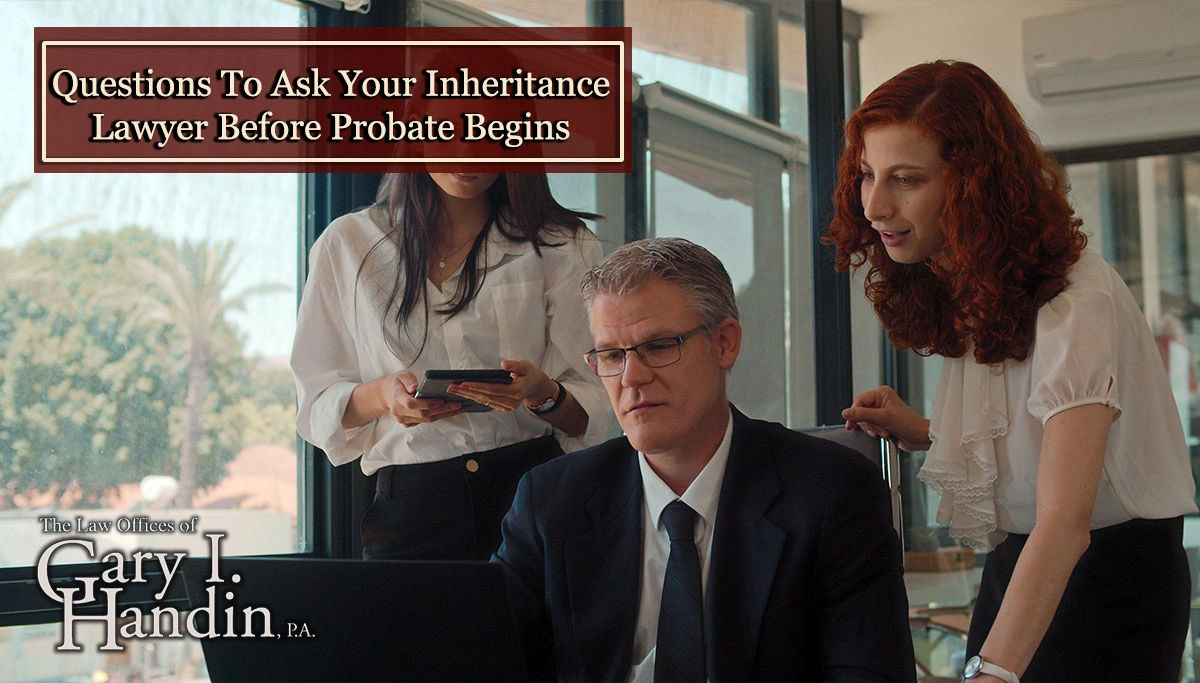
If you have recently lost a loved one and have been named as the personal representative in their will, you may be feeling very daunted by what lies ahead. The best thing you can do to ease the administrative burden you face during this emotionally challenging period is to appoint an experienced probate or estate planning attorney to represent you throughout the probate process. They will take care of every aspect of the process, helping you avoid common probate errors and ensure that your loved one’s estate is distributed as quickly as possible.
Since having a clear understanding of what to expect in the coming months will make the probate process far less overwhelming, we’ve set out a list of five essential questions you should ask your inheritance lawyer before probate begins.
What Is Probate?

For those who have never dealt with the loss of a close family member before, coming to grips with the intricacies of the probate process can be challenging.
Essentially, probate is the legal process by which a deceased person’s assets are identified and distributed to heirs following the settlement of any creditor’s claims on the estate. The ‘estate’ is simply the entirety of the deceased person’s assets – in other words, everything they owned at the time of their death. Where a person has died with a will, probate will also involve ensuring that the deceased’s will is legally valid.
Probate is legally required whenever a person dies with assets in their name. If you wish to avoid probate, you will need to ask an experienced estate planning and inheritance lawyer to advise you on the range of legal mechanisms available for achieving this.
What Is The Role Of An Inheritance Lawyer During Probate?

Every deceased estate is represented by an individual, who is called the ‘personal representative’ in Florida but is also sometimes referred to as the ‘executor’. This person is usually named in the deceased’s will, but can also be appointed by a court when a person has died without a will (i.e. ‘intestate’). Since probate is a court-supervised process that is legally complex, Florida probate law requires that the personal representative must be represented throughout the probate process by a lawyer. They will handle all the administrative and legal aspects of the process, which typically unfold in four stages once an inheritance lawyer has been appointed.
First, the lawyer must file a petition that notifies the heirs and beneficiaries – that is, all those named in the will or those who stand to inherit in terms of intestate succession law – that probate has commenced. A notice will also need to be published giving creditors notice of the probate hearing so that they have an opportunity to file claims with the estate.
Next, the lawyer will need to prepare an inventory of all the deceased’s assets. In some cases, some of these assets will need to be liquidated to settle creditors’ claims. In the third stage, the inheritance lawyer will determine which creditors’ claims are legitimate, and settle these claims together with any other estate liabilities, such as funeral expenses, medical bills, and unpaid taxes.
Finally, they must draw up a plan for the distribution of the remaining estate assets, which the court must approve in a probate hearing. Once this approval has been granted, the assets will be transferred to the heirs accordingly.
Five Key Questions To Ask Your Inheritance Lawyer Before Probate
Your lawyer will play a pivotal role throughout the probate proceedings – not only will they handle all the legal aspects of the process and help you avoid common probate mistakes, but they will also provide you with invaluable emotional support during this challenging period in your life. To help you gain a clearer understanding of what lies ahead and establish a good rapport with your attorney in your first consultation, we’ve put together a list of five important questions you may want to ask them.
1) What Documents Do I Need?
Your Probate lawyer will need many documents from you as the process unfolds. To make the process of collating these documents easier for both of you, it’s a good idea to ask them up front which documents they are likely to need along the way so that you can begin looking for them. They will also explain which documents you will need to forward to them as you receive them, for example, bills, cancellation notices, and invoices relating to funeral and burial expenses.
2) What Will My Involvement Be At Each Stage?
You will find probate less stressful if you know what to expect from each stage of the process. Ask your inheritance lawyer to explain the various aspects of probate to you in detail, and follow this with questions about what your role will be in each stage. Every probate is different, and every probate lawyer will work slightly differently from the next, so it’s good to get a sense of your lawyer’s preferred approach and how much involvement they will require from you along the way.
3) Are You Anticipating Any Complications With This Particular Probate?
While many probate processes are fairly straightforward, some are complicated by ambiguous will clauses, litigious beneficiaries, or difficult estate creditors. Give yourself peace of mind by having a detailed upfront conversation with your inheritance lawyer about any aspects of your loved one’s estate that you are concerned about. This will help you to prepare for, and possibly even mitigate, any complications that are expected to arise.
For example, if there is likely to be conflict between the estate beneficiaries due to a particular clause in the will, speak to your lawyer about how you can broach this issue with family, perhaps even with the help of a mediator, to avoid lengthy litigation over the distribution of the estate assets.
4) How Long Will The Process Take, and How Regularly Can I Expect Feedback?
Many people who lose loved ones become frustrated by the length of probate proceedings. Unfortunately, due to the nature of the process and delays in the court system, even a relatively simple probate can take many months to complete. More complex probates can take years. It’s a good idea to manage your expectations by gaining clarity upfront about how long the process is likely to take, although you should remember that nothing is guaranteed.
You should also ask your inheritance lawyer what the major milestones in the probate process are, and discuss how regularly they will provide you with feedback.
5) What Is Your Hourly Rate and Fee Structure?
Last but not least, you should inquire early in the process what your lawyer’s hourly rates are and how their fees are structured. In many cases, probate attorneys will only charge the bulk of their fees once the estate has been finally wound up. In the event that the probate proceedings become contested, you may need to negotiate a different fee structure with your attorney.
A Trusted Coral Springs Inheritance Lawyer Can Answer All These Questions and More

Navigating probate doesn’t need to be overwhelming. At the Law Offices of Gary I. Handin, P.A., we strive to make the probate process as stress-free as possible for our clients. We have worked with thousands of families in the Coral Springs, Tamarac, and Margate communities, helping them through some of the most difficult periods in their lives.
With our team’s many decades of experience in South Florida probate proceedings and estate planning, you can rest assured that your loved one’s estate is in good hands. For an experienced inheritance lawyer who will handle your probate proceedings with sensitivity and care, contact us today at 1-877-815-4560.





